Lalon Fakir says :
“You will find the priceless gem
At the present
Worship the simple Man as divine
Worship the human feet
You will get the
Quintessence of eternity”
Lalon Fakir mówi :
“Właśnie tu i teraz znajdziesz bezcenny klejnot
Czcij prostego człowieka jako Boga, czcij stopy jego
a zbliżysz się do istoty wieczności”
“Where lies this mystery of human soul?
Where from I came and where shall I go?
Lalon’s says:
How does the strange bird
flit in and out of the cage,
If I could catch the bird
I would put it under the fetters of my heart.
The cage has eight cells and nine doors.
Above is the main Hall with a mirror chamber
O my mind, you are enamoured of the cage..
little knowing that the cage is made of raw bamboo,
and may any day fall apart
Lalon says: Open the cage, look how the bird wings away!”
“Gdzie leży tajemnica ludzkiej duszy?
Skąd przybyłem, dokąd pójdę?
Lalon mówi :
Jakże ten dziwny ptak,
wciąż z klatki ulatuje i do niej wraca
Gdybym tylko mógł go schwytać
Splątałbym go więzami swojego serca
Ta klatka ma osiem pokojów i dziewięć bram
Ponad nimi główna komnata, sala luster.
O umyśle który ją stworzyłeś i w klatce jesteś zakochany
Pamiętaj, nietrwała, rozpaść się może w każdej chwili
Pozwól wcześniej ptakowi odlecieć.”
The songs of Bauls are designed as conversation, question and response, often sung by guru and disciples as part of teaching process. They speak of most important philosophical issues and as such can not be direct, are saturated with riddles, the riddles that can only be fully solved by each individual life, the whole answer is inside each human being. That is why Baul traditon so often mingles with Sufism, that claims there is not one way, but many, although they lead to same conclusion. Bauls and Sufi fakirs are close friends, sometimes those distinctions are blurred, often on purpose, as they avoid being put in cages, and labelled. In hundreds of years of such existence, of organic growing, assimilating views of the other, Bauls embraced elements from Hinduism, Tantric Buddhism, and Sufi Islam, discarded what did not suit them and developed their own unique belief system from what remained. With this eclectic approach to spirituality, they seek to distill from all religious disciplines the simplest, most natural, and direct approach possible to God. They believe that authentic worship of God takes place only deep within each person where ‘God’, the divine ‘man of heart’ is enshrined. Hence, the essence of Baul belief is that God is hidden in the heart of man and neither priest nor prophet, nor the rituals of any organized religion will help man to find God there. They believe that church, temple, and mosque only stand in the way and impede this search. To the Baul, our bodies are the temples – the shrine of the soul. So they are on the far side side from those who claim the world of the spirit being opposite to this, material world, on the contrary, this world and this body is what we have at our disposal , what we must take care of.
The Bauls believe that the God within them is the same as the God within all human beings. Therefore, there is no reason not to be at peace with all of mankind regardless of how one chooses to recognize their version of the ‘Supreme Being’ or practice their faith.
Of course, in the ancient and traditionally strict religious Far East, their way tended to stimulate some controversy. Consequently, for at least the last 600 years, both orthodox Hindus and Muslims have branded them as ‘mad’. They were scorned, disregarded by Bengali elites ( until Tagore, the famous Nobel winner started to promote Baul heritage, then of course crowd followed ), they were even persecuted, all too common fate of all the mystics preaching similar message to radical to establishment to accept, from ancient gnostics to Sufi martyrs such as Al-Hallaj. Lalon Fakir sings :
“Fakir Monsur Hallaj said
I am the truth
It was correct for Lord’s law
Shariat does not understand.”
Pieśni Baulów mają formę rozmowy, pytania i odpowiedzi, często na żywo śpiewane są właśnie jako dyskurs między guru a jego uczniem. Wyjaśniać mają przy tym zwykle ważne filozoficzne kwestie, nie mogą być więc zbyt jednoznaczne i dosłowne, pełne są zagadek które w pełni rozwikłać może każdy wewnątrz siebie, poprzez własne życie. Dlatego tradycja Baulów tak często zbliża się do filozofii sufizmu który mówi o tym że nie ma jednej drogi, ale tyle dróg ile ludzi nimi kroczących, chociaż wszystkie prowadzić mają do tego samego wniosku. Baulowie i fakirzy to zwykle bliscy przyjaciele, czasem to rozróżnienie nie ma znaczenia, czasem celowo jest negowane przez nich samych, niechętnych szufladkowaniu. Przez setki lat takiego funkcjonowania, organicznego rozwoju, przyswajania poglądów swych braci i sąsiadów Baulowie przejęli elementy filozofii hinduizmu, tantrycznego buddyzmu, sufizmu, pozbyli się tego co nie odpowiadało ich praktyce i samoobserwacji, i rozwinęli własny, unikalny system wierzeń. Jego rdzeń to wydestylowane z wielu tradycji jak najprostsze, jak najbardziej naturalne i bezpośrednie podejście do kwestii Boga. Wierzą, że autentyczne oddanie mu czci ma miejsce tylko we wnętrzu każdego człowieka, gdzie żyje mityczny “człowiek serca”, coś co w dualistycznym rozumieniu, zrozumiałym także przez chrześcijan, byłoby odbiciem boskich cech, ale w niedualistycznym postrzeganiu świata Allah to Adam. Aby to zrozumieć, nie jest potrzebny żaden kapłan ani rytuał zorganizowanej religii, wręcz przeciwnie, odrzucając boskość człowieka popełniają one dokładnie ten sam błąd co upadły anioł, a przez fałszywe podziały, kościół, świątynia i meczet stoją na drodze do zrozumienia. Dla Baulów jedyną świątynią jest ciało. W takim rozumieniu dalecy są od uduchowionych mistyków odrzucających ten świat – wręcz przeciwnie, ten świat, tu i teraz to właśnie to co mamy do dyspozycji i o co mamy dbać.
Baulowie wierzą, iż Bóg w nich to oczywiście ten sam Bóg co w każdej innej ludzkiej istocie, nie ma więc żadnego powodu by nie żyć w pokoju z całą ludzkością, wszystkimi, nieważne jakimi słowami określaliby swą duchową rzeczywistość, jak wyglądałaby ich praktyka. Oczywiście od zawsze w tradycyjnie religijnym i pełnym podziałów świecie południowej Azji takie poglądy wzbudzać musiały kontrowersje. Przez ostatnie 600 lat zarówno konserwatywni Hindusi jak i muzułmanie nazywali Baulów szaleńcami. Wyśmiewano ich, pogardzano jako niewykształconymi żebrakami ( elity Bengalu zmieniły zdanie niczym barany dopiero gdy kulturę Baulów zaczął promować pierwszy indyjski noblista, Rabindranath Tagore ) , często nawet prześladowano , typowy los mistyków głoszących nowinę zbyt radykalną do zaakceptowania przez establishment, od starożytnych gnostyków po męczenników sufi takich jak Al-Hallaj. O tym ostatnim śpiewa Lalon :
“Fakir Monsur Hallaj rzekł
Ja jestem Prawdą
Tej boskiej zasady
nie rozumieją ludzkie prawa,
Sharia”
The photos above come from one evening in a remote village in Nadia, region in Bengal where tradition of Bauls and fakirs is strongest , before partition one with Kushtia in today Bangladesh, where Lalon Fakir came from.
Some ambient sound can be heard here :
“Debashish Sen sings Baul poetry”
Powyższe zdjęcia oraz nagranie pochodzą z wieczoru w małej wiosce połozonej na pograniczu Indii i Bangladeszu, w regionie będącym ojczyzną Baulów, fakirów, w tym samego Lalona :
“Debashish Sen śpiewa poezję Baulów”

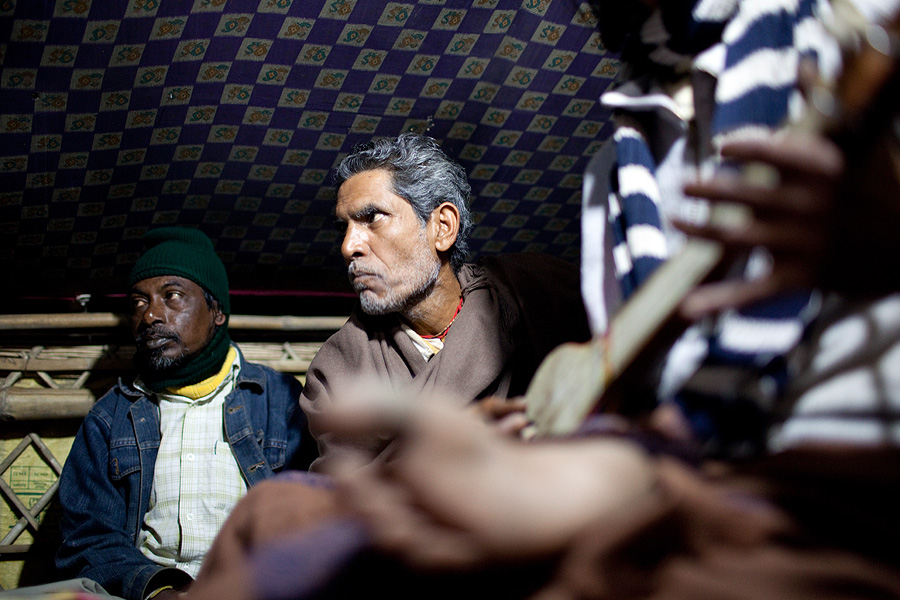
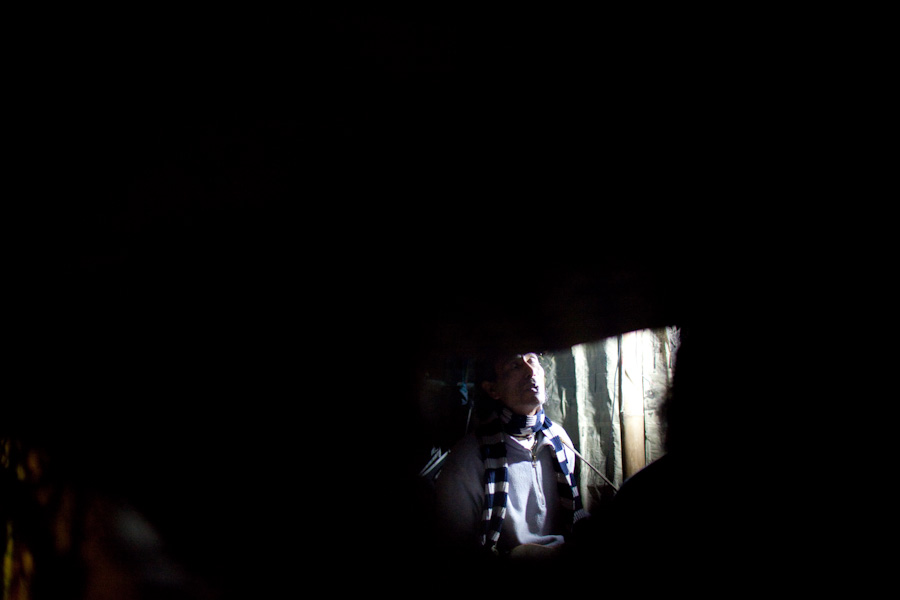
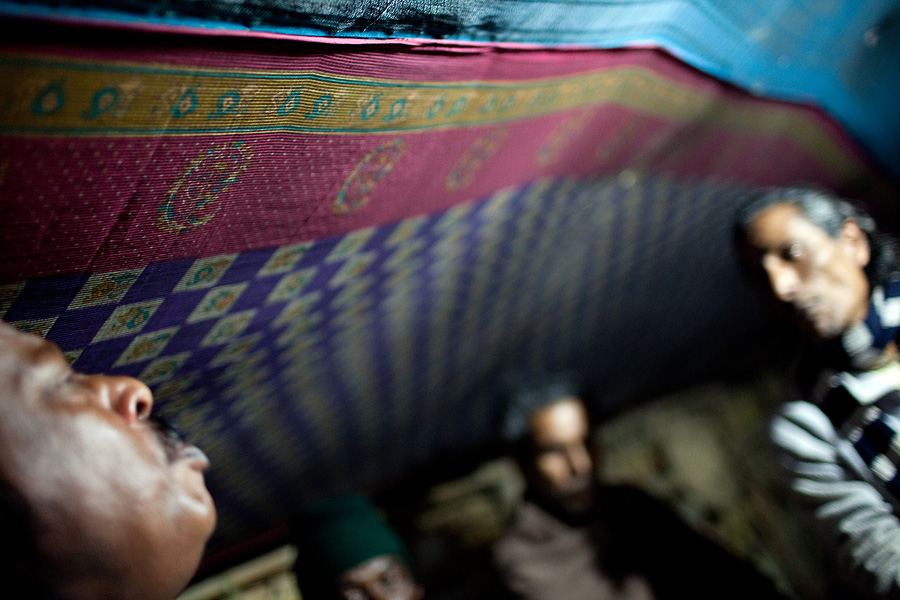
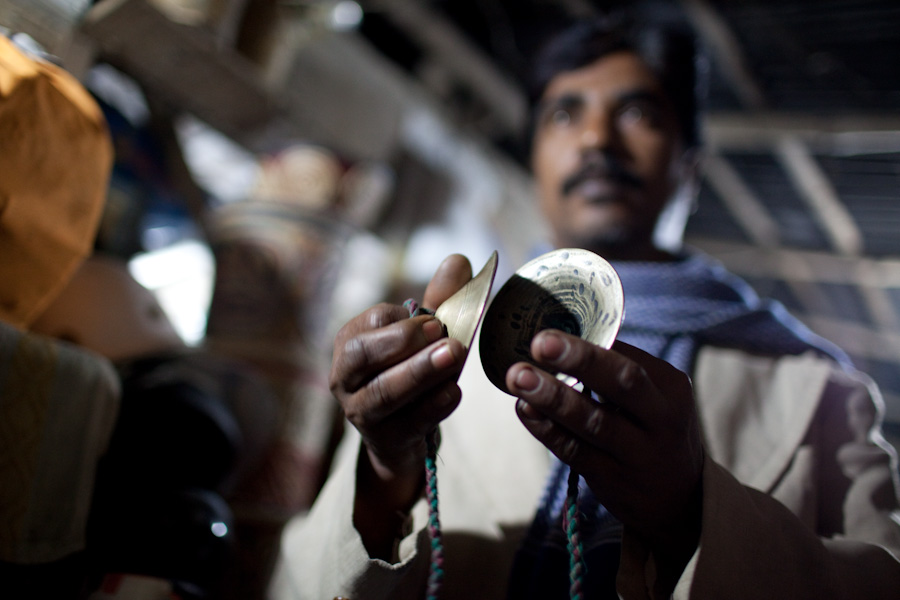
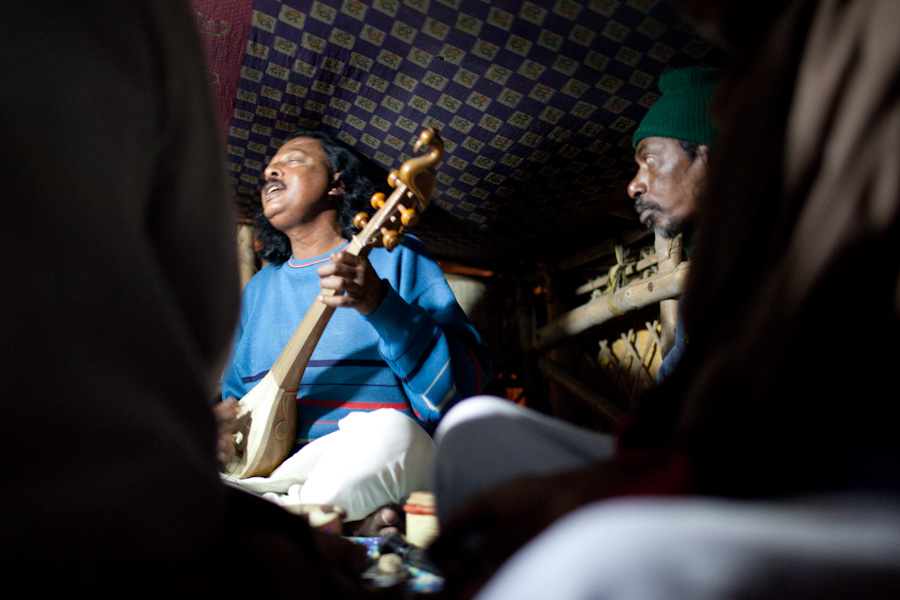
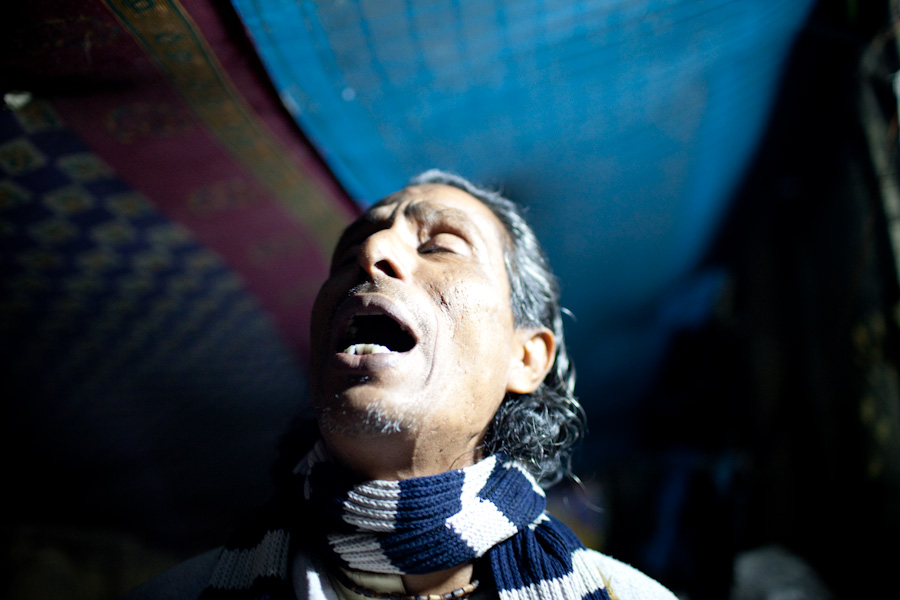
February 19th, 2012
Baulowie Hurrrra:)
piszesz coś o nagraniach…
da się to usłyszeć?
February 19th, 2012
no przecie jest link…jeden plik na razie, moze bedzie wiecej ale pozniej